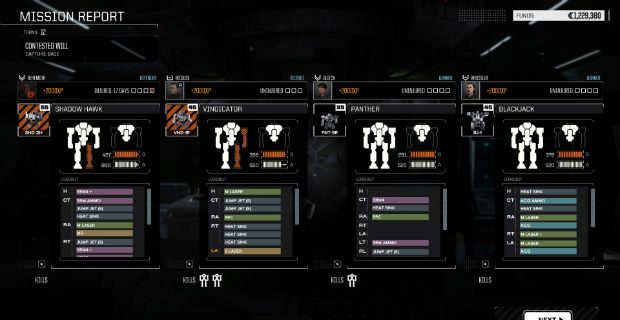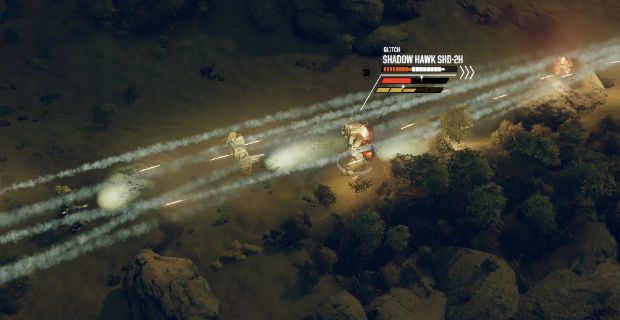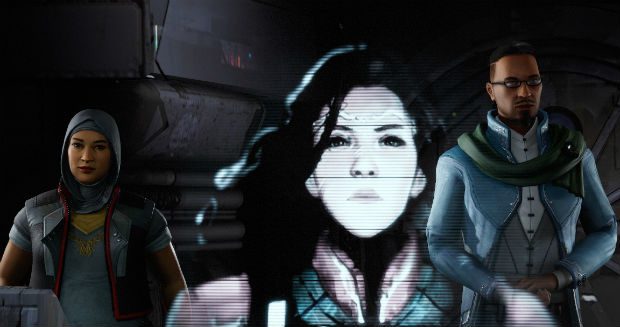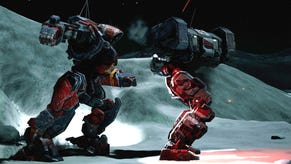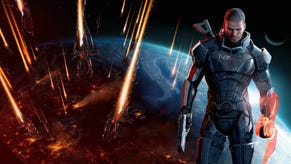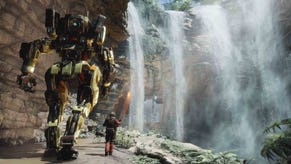Learning to love BattleTech: an evolving opinion
Third time's the charm
A couple of days ago, I started BattleTech's campaign over from the start. For uninteresting technical reasons I'd had to use a different Steam account when playing it for our BattleTech review, but the savegames wouldn't then load on my usual account. I'd been fairly frustrated by the turn-based mech combat game's treacly pace and janky interface, and so didn't intend on this do-over lasting long. As it happened, I played until I reached where I'd left off in my previous campaign.
It took half the time it had done before, and my blood rarely reached the tempestuous boil that had characterised my broadly unimpressed pre-release experience. And then I kept on playing. I have no current intention of stopping. I am enjoying myself immensely, mostly. BattleTech's failings very much remain failings, but they're not the obstacle to happy bot-blasting that they once were. So what changed?
Well, as I say, it took half the time. More progress, more quickly. The reason for that is that I am now exactly twelve times better at playing BattleTech than I was before. Maybe even thirteen.
I've mentioned previously that BattleTech's interface isn't a terribly helpful one. To clarify that: despite an abundance of tooltips, establishing what's probably going to happen to both your target and your own mech when you fire involves flitting your eyes between quite a few different parts of the screen and doing some manual maths.
It's the nature of the BattleTech beast to some extent, in that an underpinning of random dice-rolls means you can't usually stipulate exactly where on the enemy's vast iron frame your shots will land. Because different areas of it have different amounts of armour, a projected damage counter would thus be about as accurate as a 1970s BBC weatherman. Even so, the bitty and scattered interface approach chosen doesn't do a smart job of pushing the info you most need front and centre, but far more catastrophic is a tutorial that gives up almost before it's begun.
This is a game with a great many concepts - and pleasingly giant robot-specific concepts, as I wrote earlier this week - that fall far from the familiar turn-based tree. This is stuff that's second-nature to the BattleTech boardgame hardcore, which has meant a split between people who hit the ground running and people either spending a few terms in the school of hard knocks, or needing the help of lengthy, community-made guides on Steam and YouTube. Some 15 hours into playing BattleTech for review, I'd figured out most of the unspoken rules of efficient engagement for myself, but still had the psychological legacy of hours spent waiting for all those unnecessarily slow missile animations to deal uselessly small amounts of damage. Now, those unhappy hours are melting away as I become more and more accustomed to a bright new world of brutal tactical efficiency, at least within the confines of of the game's overall sluggishness.
Even once I had gotten fully to grips with it, the ongoing excess of dead time drove me - drives me - spare. I can practically hear the game's gears turning, the confused pause as it receives its instruction to pointlessly drag its shuddering camera there and back again or to load one of its tiny handful of squad audio barks, the wasted seconds between a swarm of missiles demolishing something's leg and it toppling to the ground, the lovingly-made but unnecessarily glacial speed of projectile firing animations themselves. (This is with all the action camera options deactivated, just to reiterate). Each handful of dead seconds would not matter alone, but added together it can be agony. Even now, I always alt-tab out during any enemy turn that involves more than one or two units. Crucially though, this no longer keeps me from wanting to play more.
There's a mid-campaign story mission, which I've played three times now, requiring you to destroy a building at the far end of the map within a certain number of turns. You've got to get close to it before you can shoot it, but there's a large squad of fairly tough enemy mechs en route to it, and to help you out, there's a half-dozen AI-controlled friendly turrets that take potshots at the baddies. I didn't make an exact headcount, but it adds up to around a dozen computer-driven units compared to four player-controlled ones.
On paper, it's neat little remix of BattleTech's usually rinse'n'repeat scenarios; in practice, it feels like trying to hastily complete your weekly shop before you miss the bus home, only to bump into a different slightly boring acquaintance and have to have a stop'n'chat every time you move into a new aisle. So much interruption between progress; so much zimmer frame-slow interruption. I wouldn't be surprised if I had nightmares about playing that mission again.
However. However, however, however. When I alt-tab out during an enemy turn now, I do so invariably knowing more or less what's going to happen already: I know the game's untold rules very well by now, about how to deftly juggle evasion and rotation and initiative and stability and different weapon ranges so that I already known exactly who's shooting next and in what order, who they're most likely to hit and where, what they can and can't hit it with and how damaging it is ultimately likely to be. There's a certain kind of power trip that comes with knowing all this at a glance - of being presented with complex, potentially deadly situation and being able to solve it in your head in a matter of seconds. A well-executed plan makes me cackle with glee now.
It's never a slam dunk - random numbers means I might well return to find a mech with a missing limb or an injured pilot - but it's the difference between waiting to find out what happens and waiting to continue with my plan. It's the difference between waiting for the washing machine to finish so you can go hang your pants out to dry, and waiting to see if the washing machine even managed to get your disgusting pants clean or not.
Equally, I now often know far in advance on which turn and with which of my mechs I will land a killing blow. The animations, status updates and camera shudders are no less glacial, but - and this really is a profound change in my feelings about the game - I can now derive massive satisfaction from seeing my careful plan resolved in a hail of unhurried lasers and missiles.
I've got a Hunchback mech on my squad right now, which sacrifices all explosives for a vast array of (mostly) medium lasers. Boring to behold, with BattleTech's sadly characteristic minimal sense of impact, if all you're doing is carving away a few blobs of armour, but a glorious, celebratory lightshow when you've softened the enemy up enough already to know that this attack will be fatal. Man, I love that Hunchback. I've stuck a couple of ++ lasers on it, and I guard them jealously. I don't know where Hunchbacks stand in the BattleTech hierarchy of approval, but it feels like mine - the lack of that point of connection with my oft-interchangeable mechs was something else that kept me at such distance from this game until a couple of days ago.
I haven't spent decades imagining BattleTech's world of plastic and cardboard come to life like this, but I'm increasingly understanding that the heavy metal ponderousness is there to amplify the sense of pay-off. Taking out or knocking down a robo-tank the size of a house is a big, big deal. And now I can do it relatively reliably, it feels damn good. I do now see a BT mission not as simply a slow-motion war of attrition, but as a set of tactical puzzles to solve as efficiently as possible. I don't play simply to win - I play to win with minimal, and ideally no, damage to any of my mechs. A glorious victory - and a massive speed-up to the strategy/base layer of the game too, given that less time and money sunk into repairs means I can do more missions more quickly, and buy more upgrades.
I wouldn't say BattleTech is exactly flying by now, but the delays feel simply irritating, rather than excruciating. I can take them on the chin because I'm getting so much out of the tactical heart of the game now. I know what's truly meaningful to my enjoyment of a smart and distinctive turn-based strategy game and what can be shrugged off as merely unfortunate frippery. It's a bit like watching a film in the wrong aspect ratio - it feels unbearable to start with, but if the movie's compelling enough, you eventually stop noticing. If only it hadn't taken the best part of twenty hours of badly-explained and treacly grind to reach this point.
Which brings me to the matter of why I returned to this well despite the frustration I expressed in the review. I'm old enough and ugly enough and of the internet generation enough to pay little heed to over-protective fanbases snarling like jilted lovers when their brand of choice is ill-treated, so it wasn't driven by the negative community response to the piece. I'm also old enough and ugly enough to know that, if I'm being an outlier when a bunch of people I know and respect and have broadly similar tastes to have positive things to say about a game I didn't dig, it bears further investigation. It's happened a few times in the past - sometimes it's because peers' pre-existing enthusiasm for something blinds them to its failings, sometimes it's simply an insurmountable difference of opinion, but sometimes it's a dense cat's cradle of factors that meant we each had very different experiences.
I could take a few guesses about what those were, but they're functionally irrelevant here. What matters is that, in this case, returning to the game looking for why people I admire were full of praise for it, coupled with the fact that my hours of playing it and learning its opaque ways meant I hit the ground running in this fresh start, meant I was able to find it. Which in turn meant that I am now playing BattleTech in every stolen moment, although a lot of those moments are spent alt-tabbed and staring at Twitter while a half-dozen lumbering enemies slowly dash themselves against my carefully-arranged rocks. And some of those moments are spent refreshing various BattleTech webpages in the hope that they've just announced a patch with more speed-up options.
I stand by what I wrote in the review, with the possible exception of wishing I'd opened with a different tone - dropping the b-word is dropping the b-word, no matter how quickly one follows it up with lamentation about dropping the b-word. It's an honest document of how I, as someone not-versed in BattleTech ways, including not having played or watched streams of the beta, felt about the game after pushing twenty hours of play. It's an honest document of how BattleTech fails to welcome in the non-hardcore, and of an abundance of rough edges and hollow time-wasting that shouldn't have been in a high-profile game from a major publisher.
The same sentiment abides now, but with the positives amplified: this is an excellent tactical mech combat game that is distinctly its own entity and none-more mechy, compromised by numerous unfortunate presentation fudges. The difference between then and now is that I am more-or-less contentedly playing it despite those problems, as opposed to waiting for them to be solved. Spending more time with something can make feelings harden, or it can cause them to evolve. In this case, I'm happy to say it's been the latter. I wish BattleTech wasn't as janky as it is or as sterile as it often looks, but becoming lethally efficient at it brings new joys I simply didn't experience in my first lengthy amble around its block. What a deeply satisfying game of turn-based robo-demolition this can be. I can't wait for that patch, but in the meantime, I'm having a great time. So it goes.


